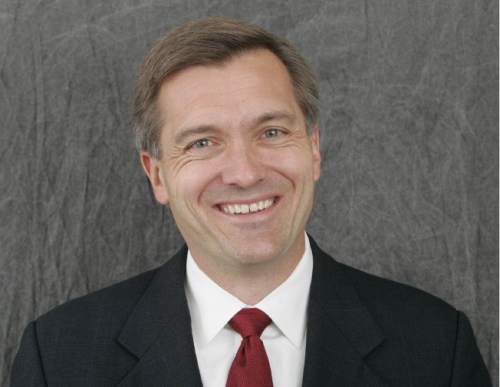This is an archived article that was published on sltrib.com in 2016, and information in the article may be outdated. It is provided only for personal research purposes and may not be reprinted.
At a time when those on either side of the aisle can barely agree on the color of the sky, we find common ground in our commitment to keep the United States safe, bolster our economy and demonstrate our highest values as Americans. In an increasingly interconnected world, these shared goals are met through our nation's small, but strategic investment in U.S. development and diplomacy programs. Together, as a former governor and member of Congress, we believe that maintaining American leadership overseas is not a Democratic or Republican issue — and that these efforts must be strengthened.
Agencies like USAID and the Peace Corps work tirelessly to establish good governance and rule of law in struggling areas. Global health initiatives that aim to prevent and treat HIV/AIDS and malaria help communities thrive without the threat of disease. With health security comes proper nutrition and the ability to pursue an education and earn a living. Over time, communities that once struggled can start small businesses, grow their own food and even connect to the internet. Countries with established financial, educational and governing systems are destined to join the global economy and become strong trading partners for American companies.
As the co-chairs of the new Utah Advisory Committee of the U.S. Global Leadership Coalition, we know that American leadership overseas is vital to our national security, economic prosperity and our core values as a country.
As the home state to Hill Air Force Base — where so many of our family members, neighbors and friends serve — we know that sending our troops into harm's way should always be a last resort. It's a decision we want to avoid unless it's absolutely essential to our nation's interest and security. When we teach communities sustainable farming, provide children access to education and connect rural areas to electricity, we give developing regions tools for stability and reduce the ability of extremist voices to gain influence.
Similarly, development and diplomacy are key to increasing our access to emerging markets. With 95 percent of consumers living outside our borders, we must focus on how to maximize our profits in the global economy. Utah exported $18.7 billion in goods and services abroad last year and 86 percent of those exporting were small and medium-sized companies. And our international programs are vital to promoting fairness, reducing corruption and creating stability so Utah's businesses can invest overseas. We must continue to strengthen these opportunities.
Our international programs are highly effective, accountable and transparent. Our HIV/AIDS programs have saved the lives of more than 9.5 million people. In the last 25 years, America has helped cut extreme poverty in half across the world and we've dramatically reduced child and maternal mortality. In the aftermath of World War II, we helped Europe and Japan in their recovery, and they've since become some of our top trading partners. In the last decade, our investments in what is known as the Plan Colombia program quelled the rise of narcoterrorism and now Colombia is the third-largest export market for the U.S. in Latin America.
Throughout our history, investing in foreign assistance has always demonstrated our highest values as a nation and it has proven to be a win-win for our country here at home. This is what America does best and is central to how we shape our world.
As a nation, we should be proud of these incredible achievements, but we still have more work to do. We are confronting the largest refugee crises in decades — with more than 60 million people displaced — the greatest number since World War II. And our world and nation are threatened by new pandemics — last year it was Ebola, now it's Zika. America cannot turn a blind eye to these emergencies.
Our international affairs programs make up just one percent of the entire federal budget, and funding has steadily decreased year after year. If we continue to cut funds for development and diplomacy, we may find ourselves unable to keep pace with the growing crises we face overseas.
Our nation faces a choice: We can isolate ourselves from the challenges we face or — alongside our military — we can invest in our country's civilian tools that help keep us safe and create opportunity. We urge the Utah delegation in Congress to strengthen the investments we make in our nation's International Affairs Budget.
Jon Huntsman Jr. served as governor of Utah from 2005 to 2009 and as U.S. ambassador to China from 2009 to 2011. Jim Matheson served in the U.S. House from 2001 to 2015. They are the co-chairs of the newly launched Utah Advisory Committee of the U.S. Global Leadership Coalition.



